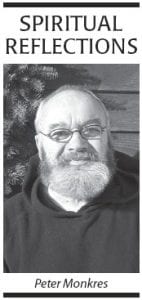I recently sent a Christmas
meditation to our sister church
in Amatenango, Chiapas,
Mexico. The parish of St.
Francis is an indigenous Roman
Catholic parish with whom
our First Congregational UCC
church in Grand Marais has
enjoyed a ten-year partnership.
This essay is an English rendition
of my message.
January 6th is the holy day of Epiphany and one central way to observe it is by honoring the journey of the Three Magi to Bethlehem. As far as we know, they were the only ones who offered presents to the baby Jesus on that first Christmas. They opened their treasure chests and shared gifts of gold, frankincense and myrrh. Why? Gold is a symbol of worldly wealth, power and privilege. We use gold to build an economic base for ourselves and achieve leverage over life. Once we feel we have enough stashed away to meet our needs, we start sharing it, perhaps giving to worthy causes like our local food shelf or even creating our own philanthropic foundation to help the poor.
In the gospel view, those who share their gold most genuinely are those who give, not out of their excess, but out of their poverty. The story of the poor widow who put a single gold coin in the offering plate is a case in point. She greatly impressed Jesus because she gave wholeheartedly, even though she had little to contribute. In the strange world of Christian economics, giving the most gold is not the indicator of a person’s generosity; it is the spirit
of one’s giving that makes all the difference. An important faith question to ask this Epiphany is, “How am I going to use some of my treasure to wholeheartedly fund the reign of God in this New Year?”
Frankincense is a type of incense. TheMagi used it at the manger to celebrate a special incarnation of God’s love. They may also have burned frankincense in order to consecrate their decision to return home by a different way because of what they witnessed at the manger.
On the last week of the Christian year, several hundred participants gathered in the village of Teopisco for a conference that we called “Mother Earth, Sacred Water.” We spent the day discussing the importance of healing and protecting God’s creation. For us, this work is part of what it means to follow Jesus Christ. So, like the Magi, we burned incense during our time together to solemnize our commitment to return home by a different way, a way of earth care.
An important Epiphany faith question for us to ask is, “How can I offer incense at the manger as a ritual of dedicating myself to Christ’s path of stewardship, to the protection of the water in the Great Lakes and the healing of the diseases of climate change and global warming?”
The third gift of the Magi was myrrh, an ointment that was used to prepare the dead for burial. Myrrh is a symbol that God loves us beyond this world just as God loves us during our time on earth. God accompanies us through green pastures and still waters as well as through the valley of the shadow of death. An important Epiphany faith question to ask is, “How can my gift of myrrh deepen my trust in the love of God and empower me to live in this New Year with a spirit of hope that overcomes fear?”
This is the promise of the Holy Day of Epiphany: Because Christ has been born another world is possible. Here, in the winter snow of the Northland, I see an Epiphany vision of wolves sharing a feast with lambs. They are eating tamales, corn, beans and tortillas in a warm and cozy inn at Bethlehem in which there is room for all. A light is shining out of the windows—a light that the winter darkness cannot overcome. There is a firein the hearth, burning brightly. This is the peace of God that warms human hearts, the peace that is the hope of the world. Happy Epiphany!
Each month a member of the
Cook County Ministerium will
offer Spiritual Reflections. For
January, our contributor is the
Reverend Peter Monkres of the
First Congregational Church –
United Church of Christ, Grand
Marais, a Just Peace church.



Loading Comments